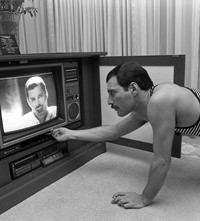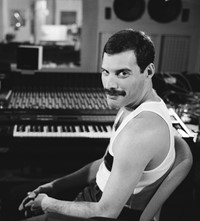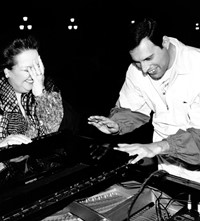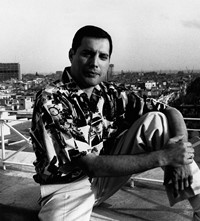Never Boring, a new box set, celebrates Freddie Mercury’s solo career. Here, alongside never-before-seen images, his friend and assistant Peter Freestone tells Another Man about what would be his final years
- TextMatt Charlton
There is a feeling at the end of Bohemian Rhapsody – the 2018 Freddie Mercury biopic – that Live Aid, in 1985, was the pinnacle, if not the climax, of Freddie Mercury’s career. Indeed, it also suggests (and re-orders) things slightly so that Mercury’s HIV and subsequent Aids diagnosis happened just before Queen had agreed to take part in the legendary concert.
This is not true – the diagnosis was in 1987. Maybe if it had actually happened before said event, then being on a stage in front of the largest gathered viewing audience in television history might have been enough for the ambitious Mercury to retire from the limelight, but this is not how it played out. Mercury went on to release a wealth of solo material in the late 80s and early 90s right up to his untimely death, and beyond. This material has been gathered together for the first time in the luxurious (he wouldn’t have had it any other way) Never Boring box set, released last month, almost 30 years after his death – which showcases the full range of his musical talents and passions, and their indelible imprint on the worlds of pop, opera and far beyond.
With exclusive access to some of the never-before-seen photos from the box set, we take a journey through Freddie’s solo years, with a tour guide in the form of Peter Freestone, who was Mercury’s close friend and personal assistant for 12 years.
“Freddie let his on-stage persona change as his off-stage personality changed. When he started, you just have to look and you can see this androgynous look which was popular in the early 70s and you listen to his voice – it was used in that sort of style. You see, Freddie was always jealous of the singers back then, as they all had a higher voice than he did, and so he had to create the music to fit in the range he had and to make it sound like he was doing everything that Robert Plant was doing. In the late 70s, he then followed the clone look – you know, with the short hair and the moustache.
“You look at so many of their live performances and it was never about them just coming on, performing their music and then going off stage. There was always the costume – Freddie always knew what costumes to wear, on which stages. He had a basic rule of thumb: ‘If it’s a big stage, you wear white. If it’s a small stage, you wear black.’ Because with white you’re seen, so yes – he was always aware, he never, ever wanted Queen to be a band that came on stage, sang their songs and went off; he wanted people to be at a show.
“It was never his intention to record as a solo artist – I think in the end it was an expectation that he then went on and did it, because before Freddie recorded anything on his own, Roger I think already had two albums, Brian already had one out and he was working on another one. So it wasn’t as though he was the first one breaking out and doing something on his own, but it was expected of a singer to go and create something on their own because so many other lead singers had done that.
“With Mr Bad Guy, his first solo album, it was different. He had to write the music, the words, everything, and it was his first attempt and he really missed his partners – you know, the people he always created the music with. And you can see that, you can hear that in some of the music on Mr Bad Guy.”
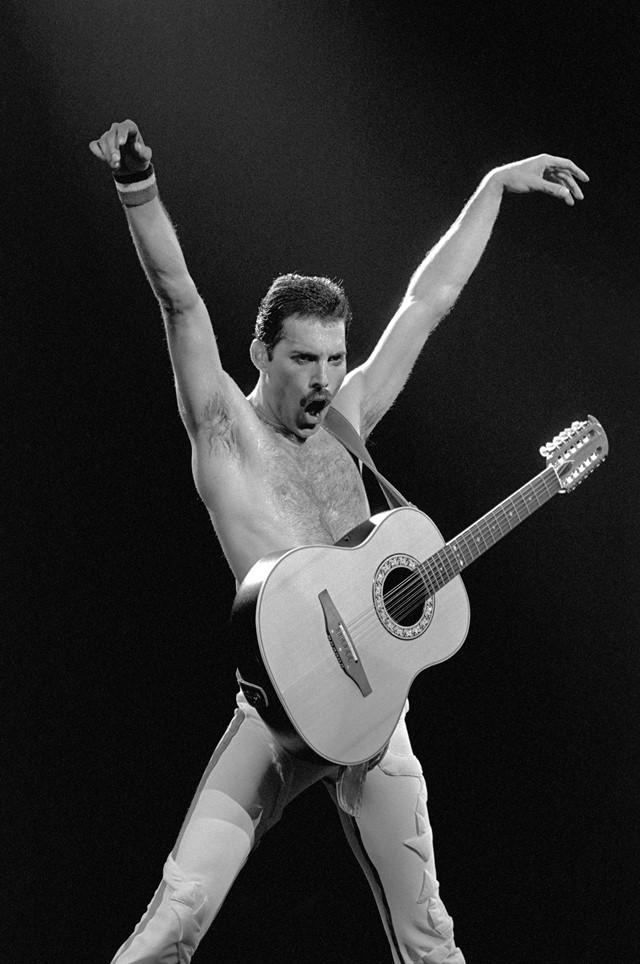
“I suppose whenever anybody says to me the name ‘Freddie Mercury’ all I can ever think of is him, at home, with his friends, just laughing, not caring. He hated his teeth and if he did an interview, he’d use his top lip to cover his teeth or he’d use his hand to cover his mouth, but at home he didn’t have to care and that is the Freddie that always comes into my mind: him, at home, laughing.
“With Barcelona (1988), it was a totally different experience to Mr Bad Guy. I don’t know the word I want to use... it was a totally different beast, because he had a collaborator – he had Mike Moran, who was there, helping him write the music and was there helping him create everything. He was writing music for somebody else which he had never done before, and he was writing music, in his mind, for the greatest voice in the world. So he was under a lot of different pressure; but that pressure worked. He was much happier in the studio creating Barcelona than he had been in Munich for Mr Bad Guy.
“My favourite Freddie solo piece is the song How Can I Go On? It’s haunting – it’s how Freddie felt basically after each song he made because he put everything he had into his music and after he created each song, he’d think ‘well, where will the next one come from?’
“That song for me says it all. In the studio when they were recording, that one had [the opera singer] Montserrat Caballé in streams of tears, because you know in the track you have them both singing, and then Montserrat sings a piece and Freddie repeats the words, he just speaks. She’ll sing something and then he says it, she sings, he says it. She was in the control room, listening to him doing this, and there would just be tears. She said ‘why do you have to have me screaming in here? You just need his voice in there and it does everything.’ So, for me that song, that’s him.
“In Mother Love [the final track Mercury recorded], there is still that amazing quality in those verses that he was able to sing. He never had lessons to become a singer. He changed his voice, he changed his stage personality to fit what he was going through in his private life.
“My favourite image of Freddie – I don’t know... I was actually looking at these images on the albums and I’m sure I saw one with him smiling on it, and that... that sums up Freddie Mercury.”
Never Boring is available now on CD and Vinyl on Mercury Records.
